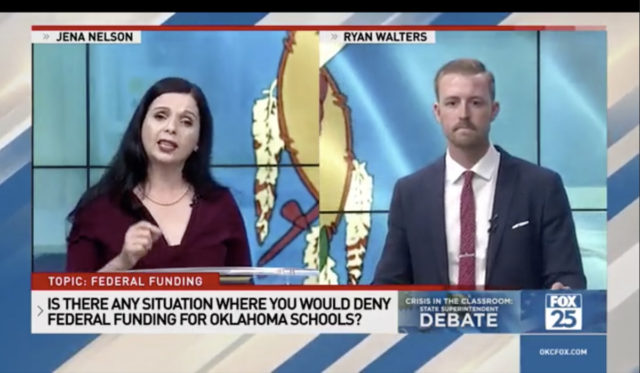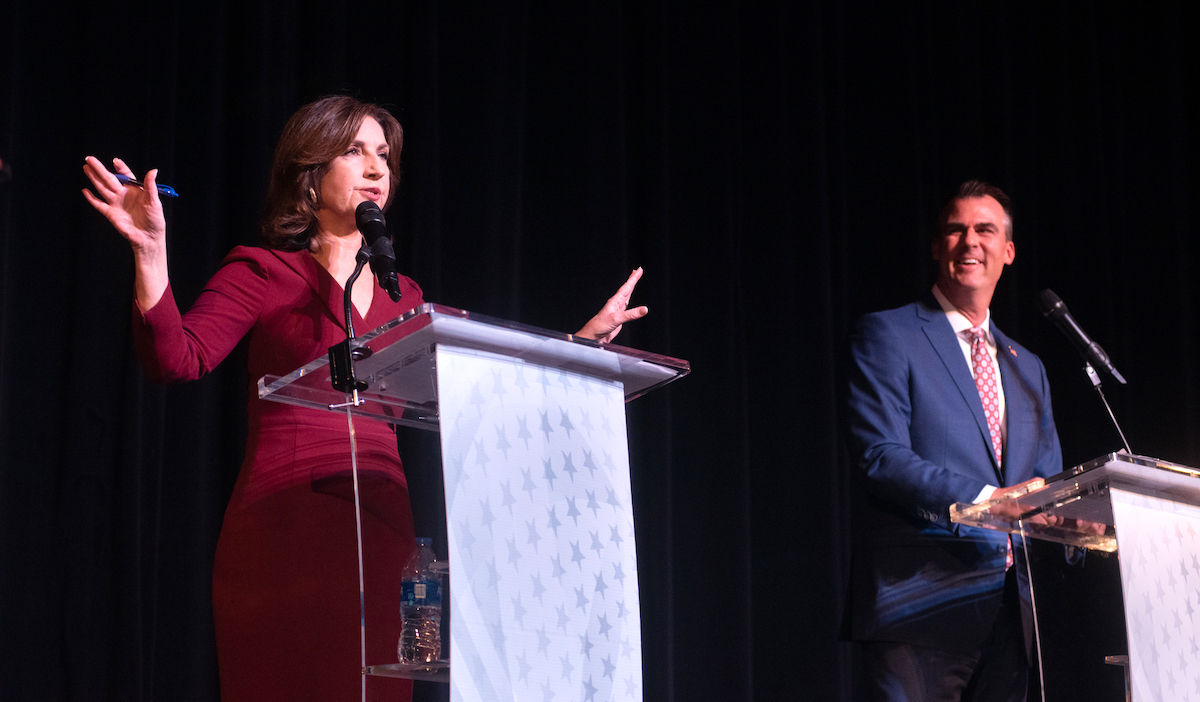

In an hour-long debate Tuesday night between the two candidates for state superintendent of public instruction, Republican Secretary of Education Ryan Walters used much of his time to criticize his Democratic opponent, teacher Jena Nelson, who also took a few shots of her own.
Each accused the other of lying and of supporting “indoctrination” during the televised debate, which was hosted by KOKH Fox 25 and is embedded below.
Answering questions that asked candidates about far-ranging culture issues but little about the day-to-day duties of the position that leads the state Department of Education and chairs the State Board of Eduction, both teachers gave their vision for improving Oklahoma public schools.
Walters has made arguments against “left-wing indoctrination” a constant refrain on the campaign trail.
Nelson, who was the state Teacher of the Year in 2020, has cast herself as a defender of public education in the wake of Walters’ divisive rhetoric.
Fox 25 posted a video to Twitter after the state superintendent debate fact-checking some of the claims from both candidates.
‘Indoctrination’ alleged on both sides
Walters made his debate strategy immediately clear with his answer to the night’s first question, which asked candidates to lay out their qualifications for the position.
Walters used the time to bash Nelson, accusing her of supporting inappropriate materials in school libraries and mentioning two books that were recently banned by Tulsa Public Schools for sexually explicit content.
“I’m going to tell you what a radical position is: her position that pornography — Gender Queer and Flamer — these books should be in every public school library and should be in our classrooms,” Walters said. “That’s a radical position. (…) What we are seeing right now in the state of Oklahoma is a civil war that’s being fought in our schools.”
Nelson declined to open hostilities that early in the debate.
“In addition to being the 2020 Oklahoma Teacher of the Year, I’ve also served on the national and the state level on committees that deal with mental health, career readiness, teacher retention, also issues that deal with child and food insecurity,” Nelson said in response to the question. “And so all of these issues are the things that I’m actually focused on.”
Nelson did address the topic of book bans in her answer to the next question, which asked where candidates draw the line on removing books from schools.
“We want to make sure we have developmentally appropriate books in our school libraries,” Nelson said.
She added that there are systems in place for inappropriate material to be reported and removed, and she called for “common sense” and “due process” in such decisions.
Walters repeated the argument he made in his first response.
“Pornography should not be in our schools,” Walters said. “You already heard my opponent Jena Nelson say that this is not an issue. She is not concerned with pornography being made available to minors in our school system.”
Nelson eventually offered a few jabs of her own, accusing Walters of mishandling pandemic relief money and calling him an indoctrinator himself over recent comments about requiring all history teachers in Oklahoma to undergo training by a Hillsdale College, a conservative Christian institution in Michigan that runs a network of charter schools.
“The patriotic education plan is not what he’s saying it is,” Nelson said. “I believe in the Constitution and I believe in American history — I believe in teaching all history. I believe in this country. I’m a proud American. I’m a proud Oklahoman, but we don’t need indoctrination of our teachers.”
The two candidates clashed again over HB 1775, a law that bans the teaching of certain concepts regarding race and gender. Gov. Kevin Stitt and Walters have touted the law as a ban on critical race theory, an academic framework taught in some colleges and law schools. The law is currently being challenged in court for being too vague.
“I am so proud of the state of Oklahoma for being one of the first states in the country to ban critical race theory,” Walters said. He added that Nelson is “not worried that our kids are being told racist concepts (…) that everything in America is racist, inherently, that white people are inherently racist.”
Walters went on to repeat an argument for which he has drawn criticism, saying that the State Department of Education should revoke the teaching certificates of teachers who violate the law.
Nelson argued for due process for those accused of violating the law, which she said threatens teachers.
“I do take offense that there’s this overall blanket of saying that teachers are indoctrinating and that we’re somehow teaching these concepts,” Nelson said. “We are not. (…) And we are constantly under threat. There are so many teachers right now that are afraid. They’re afraid to get up and teach in their classrooms because they are afraid that this law may somehow come back to get them even though they’re not teaching anything but the history standards that are listed.”
RELATED
Debate: Stitt, Hofmeister tussle over state performance, McGirt and abortion by Matt Patterson
Debate moderators next referenced SB 615, which created a law that governs school restrooms, and they asked candidates if they believed transgender students should be able to use restrooms corresponding to their gender identity.
“As state superintendent I believe in following laws,” Nelson said. “I also want to make sure that everybody, of course, feels safe when they come into our schools.”
Walters said the far-left’s “radical gender theory” had made bathrooms an issue, and he ignored the existence of intersex individuals.
“There’s boys and there’s girls,” Walters said when moderators pressed him on which bathrooms transgender students should use. “A biological boy should not be entering the girls’ bathroom. I don’t know how else to put it. There’s two genders — there’s boys and there’s girls.”
Vouchers and teacher pay
The fireworks continued when the state superintendent debate turned to the issue of school vouchers. Walters has been a vocal proponent of a proposed plan to create education savings accounts to allow parents to use government funds to pay for private school or homeschooling.
“I stand with students and I stand with parents,” Walters said. “I believe that no one knows best for their child’s education than their mom and their dad.”
Nelson argued that voucher plans hurt rural schools in areas where parents have few other options.
“Vouchers are a way to defund public education and they are a rural school killer,” Nelson said.
In a rebuttal, Walters called Nelson a liar and said that his daughter had suffered as a result of rhetoric around vouchers.
“My opponent’s been telling quite a few lies tonight, but she’s been telling them all across the state on the campaign trail,” Walters said. “My daughter in a public school is being ridiculed because my opponent has lied across the state saying I will take $130 million from public schools.”
Nelson responded that “we have facts, we have data” to back up her arguments, and she pointed out that prominent Republicans in the state have had similar objections to voucher programs.
“I’m so sorry, but it is not really in my nature to lie,” Nelson said.
To address a statewide teacher shortage, the candidates offered different plans for retaining teachers and improving teacher pay.
“I believe we’ve got to do more to support our teachers,” Walters said. “The governor and I have advanced a plan that gives teachers a pathway to make up to six figures and stay in the classroom. It’s actually a real plan.”
Nelson pushed back on Walters, supporting a recent call from current state superintendent and gubernatorial candidate Joy Hofmeister to raise teacher pay by $5,000. She appeared to also take a shot at Stitt, who said in a recent debate that his goal to make Oklahoma a “top-10 state” is “an aspirational goal” and “is something we’re never going to hit.”
“I believe right now that a $100,000 pay raise is more aspirational than actually factual,” Nelson said.





















